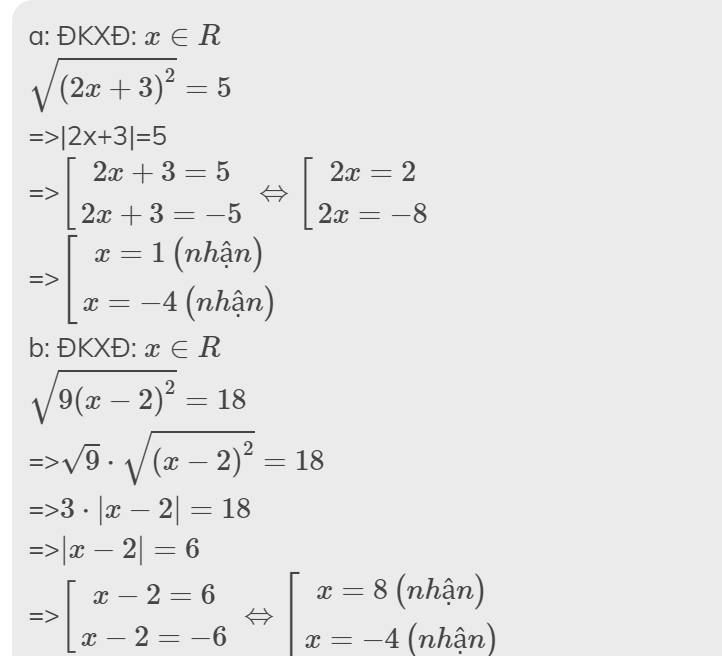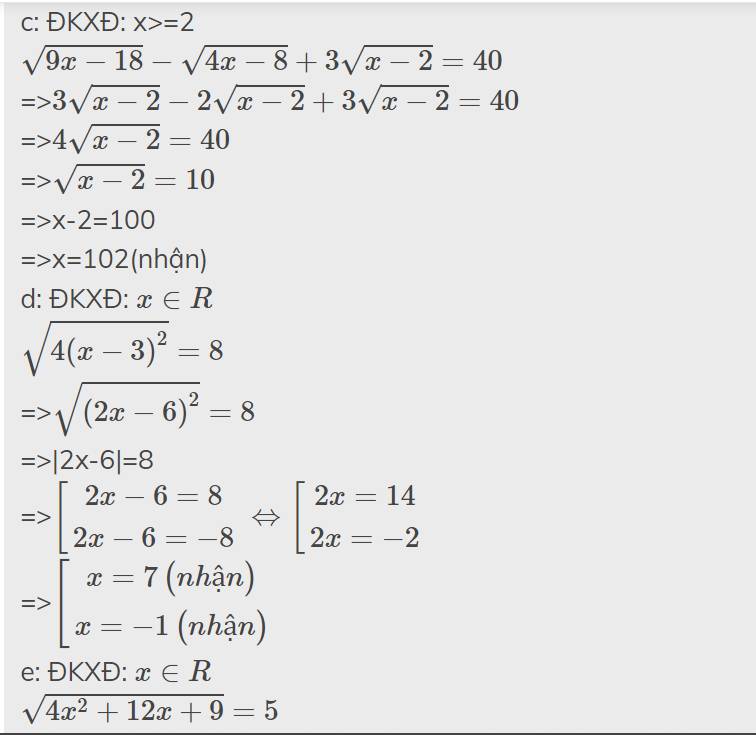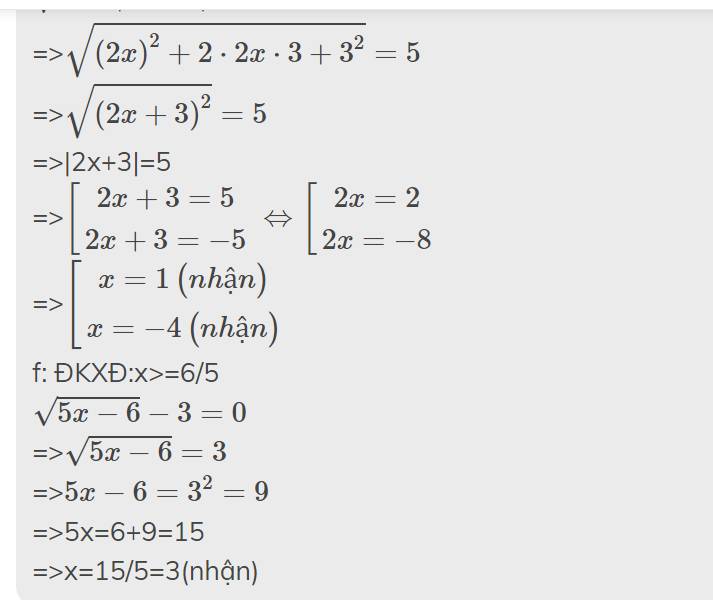Hãy nhập câu hỏi của bạn vào đây, nếu là tài khoản VIP, bạn sẽ được ưu tiên trả lời.

1) \(\sqrt[]{9\left(x-1\right)}=21\)
\(\Leftrightarrow9\left(x-1\right)=21^2\)
\(\Leftrightarrow9\left(x-1\right)=441\)
\(\Leftrightarrow x-1=49\Leftrightarrow x=50\)
2) \(\sqrt[]{1-x}+\sqrt[]{4-4x}-\dfrac{1}{3}\sqrt[]{16-16x}+5=0\)
\(\Leftrightarrow\sqrt[]{1-x}+\sqrt[]{4\left(1-x\right)}-\dfrac{1}{3}\sqrt[]{16\left(1-x\right)}+5=0\)
\(\)\(\Leftrightarrow\sqrt[]{1-x}+2\sqrt[]{1-x}-\dfrac{4}{3}\sqrt[]{1-x}+5=0\)
\(\Leftrightarrow\sqrt[]{1-x}\left(1+3-\dfrac{4}{3}\right)+5=0\)
\(\Leftrightarrow\sqrt[]{1-x}.\dfrac{8}{3}=-5\)
\(\Leftrightarrow\sqrt[]{1-x}=-\dfrac{15}{8}\)
mà \(\sqrt[]{1-x}\ge0\)
\(\Leftrightarrow pt.vô.nghiệm\)
3) \(\sqrt[]{2x}-\sqrt[]{50}=0\)
\(\Leftrightarrow\sqrt[]{2x}=\sqrt[]{50}\)
\(\Leftrightarrow2x=50\Leftrightarrow x=25\)
1) \(\sqrt{9\left(x-1\right)}=21\) (ĐK: \(x\ge1\))
\(\Leftrightarrow3\sqrt{x-1}=21\)
\(\Leftrightarrow\sqrt{x-1}=7\)
\(\Leftrightarrow x-1=49\)
\(\Leftrightarrow x=49+1\)
\(\Leftrightarrow x=50\left(tm\right)\)
2) \(\sqrt{1-x}+\sqrt{4-4x}-\dfrac{1}{3}\sqrt{16-16x}+5=0\) (ĐK: \(x\le1\))
\(\Leftrightarrow\sqrt{1-x}+2\sqrt{1-x}-\dfrac{4}{3}\sqrt{1-x}+5=0\)
\(\Leftrightarrow\dfrac{5}{3}\sqrt{1-x}+5=0\)
\(\Leftrightarrow\dfrac{5}{3}\sqrt{1-x}=-5\) (vô lý)
Phương trình vô nghiệm
3) \(\sqrt{2x}-\sqrt{50}=0\) (ĐK: \(x\ge0\))
\(\Leftrightarrow\sqrt{2x}=\sqrt{50}\)
\(\Leftrightarrow2x=50\)
\(\Leftrightarrow x=\dfrac{50}{2}\)
\(\Leftrightarrow x=25\left(tm\right)\)
4) \(\sqrt{4x^2+4x+1}=6\)
\(\Leftrightarrow\sqrt{\left(2x+1\right)^2}=6\)
\(\Leftrightarrow\left|2x+1\right|=6\)
\(\Leftrightarrow\left[{}\begin{matrix}2x+1=6\left(ĐK:x\ge-\dfrac{1}{2}\right)\\2x+1=-6\left(ĐK:x< -\dfrac{1}{2}\right)\end{matrix}\right.\)
\(\Leftrightarrow\left[{}\begin{matrix}2x=5\\2x=-7\end{matrix}\right.\)
\(\Leftrightarrow\left[{}\begin{matrix}x=\dfrac{5}{2}\left(tm\right)\\x=-\dfrac{7}{2}\left(tm\right)\end{matrix}\right.\)
5) \(\sqrt{\left(x-3\right)^2}=3-x\)
\(\Leftrightarrow\left|x-3\right|=3-x\)
\(\Leftrightarrow x-3=3-x\)
\(\Leftrightarrow x+x=3+3\)
\(\Leftrightarrow x=\dfrac{6}{2}\)
\(\Leftrightarrow x=3\)

a: ĐKXĐ: \(x\in R\)
\(\sqrt{\left(2x+3\right)^2}=5\)
=>|2x+3|=5
=>\(\left[{}\begin{matrix}2x+3=5\\2x+3=-5\end{matrix}\right.\Leftrightarrow\left[{}\begin{matrix}2x=2\\2x=-8\end{matrix}\right.\)
=>\(\left[{}\begin{matrix}x=1\left(nhận\right)\\x=-4\left(nhận\right)\end{matrix}\right.\)
b: ĐKXĐ: \(x\in R\)
\(\sqrt{9\left(x-2\right)^2}=18\)
=>\(\sqrt{9}\cdot\sqrt{\left(x-2\right)^2}=18\)
=>\(3\cdot\left|x-2\right|=18\)
=>\(\left|x-2\right|=6\)
=>\(\left[{}\begin{matrix}x-2=6\\x-2=-6\end{matrix}\right.\Leftrightarrow\left[{}\begin{matrix}x=8\left(nhận\right)\\x=-4\left(nhận\right)\end{matrix}\right.\)
c: ĐKXĐ: x>=2
\(\sqrt{9x-18}-\sqrt{4x-8}+3\sqrt{x-2}=40\)
=>\(3\sqrt{x-2}-2\sqrt{x-2}+3\sqrt{x-2}=40\)
=>\(4\sqrt{x-2}=40\)
=>\(\sqrt{x-2}=10\)
=>x-2=100
=>x=102(nhận)
d: ĐKXĐ: \(x\in R\)
\(\sqrt{4\left(x-3\right)^2}=8\)
=>\(\sqrt{\left(2x-6\right)^2}=8\)
=>|2x-6|=8
=>\(\left[{}\begin{matrix}2x-6=8\\2x-6=-8\end{matrix}\right.\Leftrightarrow\left[{}\begin{matrix}2x=14\\2x=-2\end{matrix}\right.\)
=>\(\left[{}\begin{matrix}x=7\left(nhận\right)\\x=-1\left(nhận\right)\end{matrix}\right.\)
e: ĐKXĐ: \(x\in R\)
\(\sqrt{4x^2+12x+9}=5\)
=>\(\sqrt{\left(2x\right)^2+2\cdot2x\cdot3+3^2}=5\)
=>\(\sqrt{\left(2x+3\right)^2}=5\)
=>|2x+3|=5
=>\(\left[{}\begin{matrix}2x+3=5\\2x+3=-5\end{matrix}\right.\Leftrightarrow\left[{}\begin{matrix}2x=2\\2x=-8\end{matrix}\right.\)
=>\(\left[{}\begin{matrix}x=1\left(nhận\right)\\x=-4\left(nhận\right)\end{matrix}\right.\)
f: ĐKXĐ:x>=6/5
\(\sqrt{5x-6}-3=0\)
=>\(\sqrt{5x-6}=3\)
=>\(5x-6=3^2=9\)
=>5x=6+9=15
=>x=15/5=3(nhận)

Câu 4:
Giả sử điều cần chứng minh là đúng
\(\Rightarrow x=y\), thay vào điều kiện ở đề bài, ta được:
\(\sqrt{x+2014}+\sqrt{2015-x}-\sqrt{2014-x}=\sqrt{x+2014}+\sqrt{2015-x}-\sqrt{2014-x}\) (luôn đúng)
Vậy điều cần chứng minh là đúng
2) \(\sqrt{x^2-5x+4}+2\sqrt{x+5}=2\sqrt{x-4}+\sqrt{x^2+4x-5}\)
⇔ \(\sqrt{\left(x-4\right)\left(x-1\right)}-2\sqrt{x-4}+2\sqrt{x+5}-\sqrt{\left(x+5\right)\left(x-1\right)}=0\)
⇔ \(\sqrt{x-4}.\left(\sqrt{x-1}-2\right)-\sqrt{x+5}\left(\sqrt{x-1}-2\right)=0\)
⇔ \(\left(\sqrt{x-4}-\sqrt{x+5}\right)\left(\sqrt{x-1}-2\right)=0\)
⇔ \(\left[{}\begin{matrix}\sqrt{x-4}-\sqrt{x+5}=0\\\sqrt{x-1}-2=0\end{matrix}\right.\)
⇔ \(\left[{}\begin{matrix}\sqrt{x-4}=\sqrt{x+5}\\\sqrt{x-1}=2\end{matrix}\right.\)
⇔ \(\left[{}\begin{matrix}x\in\varnothing\\x=5\end{matrix}\right.\)
⇔ x = 5
Vậy S = {5}

\(a,\) Đặt \(x^2+2x=a\), pt trở thành:
\(a^2-3a+2=0\\ \Leftrightarrow\left[{}\begin{matrix}a=1\\a=2\end{matrix}\right.\Leftrightarrow\left[{}\begin{matrix}x^2+2x-1=0\left(1\right)\\x^2+2x-2=0\left(2\right)\end{matrix}\right.\)
\(\left[{}\begin{matrix}\Delta\left(1\right)=4+4=8\\\Delta\left(2\right)=4+8=12\end{matrix}\right.\Leftrightarrow\left[{}\begin{matrix}\left[{}\begin{matrix}x=\dfrac{-2-\sqrt{8}}{2}\\x=\dfrac{-2+\sqrt{8}}{2}\end{matrix}\right.\\\left[{}\begin{matrix}x=\dfrac{-2-\sqrt{12}}{2}\\x=\dfrac{-2+\sqrt{12}}{2}\end{matrix}\right.\end{matrix}\right.\\ \Leftrightarrow\left[{}\begin{matrix}x=-1-\sqrt{2}\\x=-1+\sqrt{2}\\x=-1-\sqrt{3}\\x=-1+\sqrt{3}\end{matrix}\right.\)
\(b,\) Đặt \(x^2+x=b\), pt trở thành:
\(b\left(b+1\right)-6=0\\ \Leftrightarrow b^2+b-6=0\\ \Leftrightarrow\left[{}\begin{matrix}b=2\\b=-3\end{matrix}\right.\Leftrightarrow\left[{}\begin{matrix}x^2+x-2=0\\x^2+x+3=0\end{matrix}\right.\\ \Leftrightarrow\left[{}\begin{matrix}\left[{}\begin{matrix}x=1\\x=-2\end{matrix}\right.\\x\in\varnothing\left[x^2+x+3=\left(x+\dfrac{1}{2}\right)^2+\dfrac{11}{4}>0\right]\end{matrix}\right.\\ \Leftrightarrow\left[{}\begin{matrix}x=1\\x=-2\end{matrix}\right.\)
\(d,x^4-2x^3+x=2\\ \Leftrightarrow x^4-2x^3+x-2=0\\\Leftrightarrow\left(x^3+1\right)\left(x-2\right)=0 \\ \Leftrightarrow\left(x+1\right)\left(x-2\right)\left(x^2+x+1\right)=0\\ \Leftrightarrow\left[{}\begin{matrix}x=-1\\x=2\\x^2+x+1=0\end{matrix}\right.\Leftrightarrow\left[{}\begin{matrix}x=-1\\x=2\\x\in\varnothing\left[x^2+x+1=\left(x+\dfrac{1}{2}\right)^2+\dfrac{3}{4}>0\right]\end{matrix}\right.\\ \Leftrightarrow\left[{}\begin{matrix}x=-1\\x=2\end{matrix}\right.\)
Lời giải:
a.
PT $\Leftrightarrow (x^2+2x)^2-(x^2+2x)-2[(x^2+2x)-1]=0$
$\Leftrightarrow (x^2+2x)(x^2+2x-1)-2(x^2+2x-1)=0$
$\Leftrightarrow (x^2+2x-1)(x^2+2x-2)=0$
$\Leftrightarrow x^2+2x-1=0$ hoặc $x^2+2x-2=0$
$\Leftrightarrow x=-1\pm \sqrt{2}$ hoặc $x=-1\pm \sqrt{3}$
b.
PT $\Leftrightarrow (x^2+x)^2+(x^2+x)-6=0$
$\Leftrightarrow (x^2+x)^2-2(x^2+x)+3(x^2+x)-6=0$
$\Leftrightarrow (x^2+x)(x^2+x-2)+3(x^2+x-2)=0$
$\Leftrightarrow (x^2+x-2)(x^2+x+3)=0$
$\Leftrightarrow x^2+x-2=0$ (chọn) hoặc $x^2+x+3=0$ (loại do $x^2+x+3=(x+0,5)^2+2,75>0$)
$\Leftrightarrow x=-1\pm \sqrt{3}$
c. Nghiệm khá xấu. Bạn coi lại đề.
d.
PT $\Leftrightarrow x^3(x-2)+(x-2)=0$
$\Leftrightarrow (x^3+1)(x-2)=0$
$\Leftrightarrow x^3+1=0$ hoặc $x-2=0$
$\Leftrightarrow x=-1$ hoặc $x=2$



Xét x=2 , loại . \(=>x\in Z^+,x\ne2.\\ \)
\(=>a=x^2-4x+3\ge0,x\ne2.\\ \)
\(pt=>\left(\frac{1}{2}\right)^a+\left(\frac{2}{3}\right)^a+\left(\frac{3}{4}\right)^a=2x+\frac{1}{x^2},x\ne0\\ \)
BĐT nhỉ haha:V
cảm ơn nha